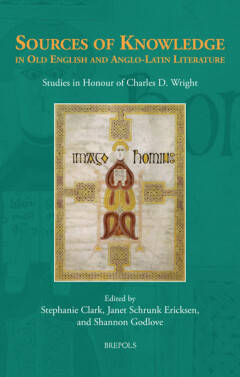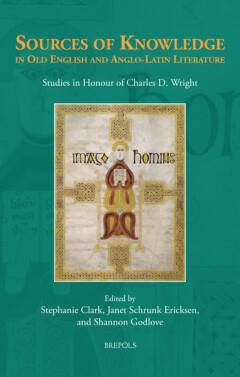
- Afhalen na 1 uur in een winkel met voorraad
- Gratis thuislevering in België vanaf € 30
- Ruim aanbod met 7 miljoen producten
- Afhalen na 1 uur in een winkel met voorraad
- Gratis thuislevering in België vanaf € 30
- Ruim aanbod met 7 miljoen producten
Zoeken
Sources of Knowledge in Old English and Anglo-Latin Literature
Studies in Honour of Charles D. Wright
Stephanie Clark
Hardcover | Engels
€ 127,20
+ 254 punten
Omschrijving
This volume positions source scholarship as integral to an understanding of the transmission of knowledge across intellectual, social, and material networks in early medieval England. Essays in this collection situate source studies in Old English and Anglo-Latin literature within a range of theoretical and methodological approaches as varied as disability studies, feminist theory, history of science, and network analysis, tracing how ideas move across cultures and showing how studying sources enables us to represent the diversity of medieval voices embedded in any given text. The essays in this volume extend the work of Charles D. Wright, who mentored a generation of scholars in methodologies of source study. The essays are organized into three sections. The first demonstrates how source studies facilitate tracing ideas across space and time. The second explores what happens to texts and ideas when they are transmitted from one culture, language, or historical moment to another. The third shows how sources illuminate wider cultural discourses. The volume attests to the flexibility of source work for early medieval English literature and arguesfor increased access to the tools that make such work possible.
Specificaties
Betrokkenen
- Auteur(s):
- Uitgeverij:
Inhoud
- Aantal bladzijden:
- 460
- Taal:
- Engels
Eigenschappen
- Productcode (EAN):
- 9782503604428
- Verschijningsdatum:
- 7/09/2023
- Uitvoering:
- Hardcover
- Formaat:
- Genaaid
- Afmetingen:
- 163 mm x 241 mm
- Gewicht:
- 879 g

Alleen bij Standaard Boekhandel
+ 254 punten op je klantenkaart van Standaard Boekhandel
Beoordelingen
We publiceren alleen reviews die voldoen aan de voorwaarden voor reviews. Bekijk onze voorwaarden voor reviews.











